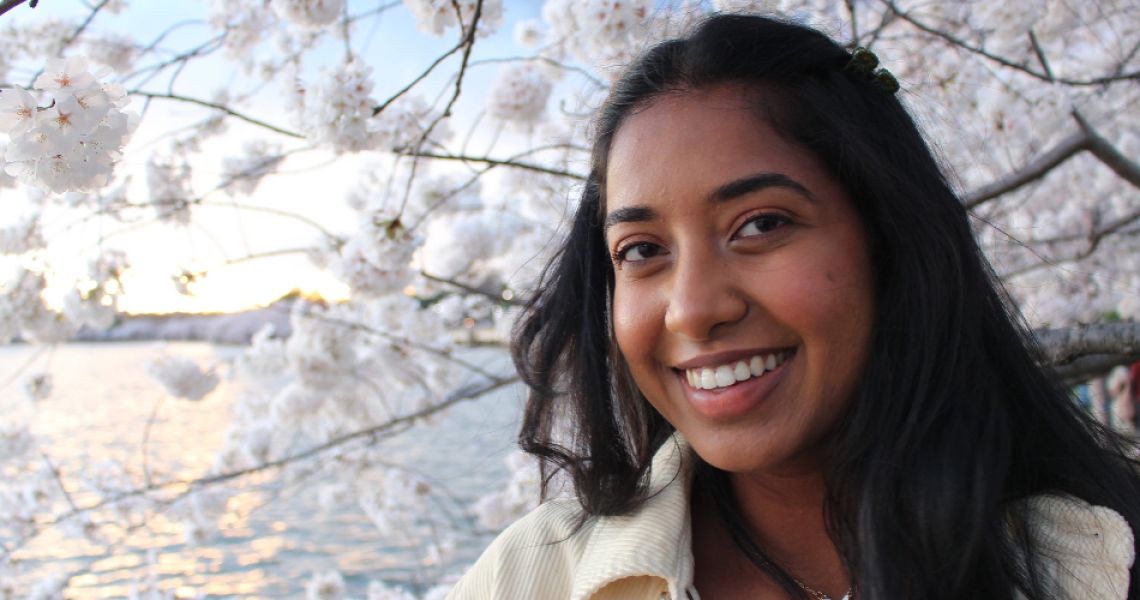
Pranathi Meda
Hometown
Columbia, South Carolina
Birthplace
Andhra Pradesh, India
Undergraduate Major
Public Health
Why GW?
I really wanted to come to GW because growing up I went to all the Southern schools for my undergrad. I went to the University of South Carolina, and I just really wanted a space where I wouldn't have to just be the token person of color. I wanted to be around other people who wanted to get to know me, but also, whom I could learn from, as well.
I feel like I'm going to walk out of here being a leader and that's a very big difference in today's world.
Why Occupational Therapy?
I originally wanted to go into medical school. I feel like a lot of people have this view, but something along the line told me I wanted to build relationships— longer relationships— and relationships that were more in-depth so I could get to know the person. They could leave a lasting impression on me, and I could do the same for them. I just wanted a practice that would give me more time with the people that I serve.
I feel like we work on that holistic aspect of someone's life, and we work on it through the things that they engage with every day, and not just looking specifically at different functions of the body, but we're looking at how they interact with their environment.
Spirituality as a Skill
I feel like something that I definitely have a lot of is spirituality, and I didn't think that was a pro until I came to GW. I feel like that helps me see things from a lens where I can take a step back and I can lean back on my religion, my culture, and my spirituality, and understand that everything changes as time passes. Whatever problems or situations we face, they're just in that moment. You're able to overcome them or go through them. And I feel like that's the mentality that gives a lot of hope to different people, and it gives a lot of hope to myself. So that's why I feel like I bring a lot to what I love.
A Location Designed to Inspire
Recently we got to do a workshop with the head of accessibility at the Smithsonian, and she was able to show us around and show us their accessibility features in an exhibit, which I think was really dope.
I think that D.C. is one of the places where you can really learn about advocacy and also learn about what it means to have a supportive environment in your clinics, like, taking accessibility and taking the museum, the structures that they've put in the museum, and the way they've designed it is a way that you can design a therapy room, is a way that you can design different aspects of people's life.
There are a lot of systemic issues that rise up in work, and as a practitioner, I feel like I see a lot of people complain and I was one of those complainers. But there was never any action taken. I feel like here, instead of complaining, I'm getting the courage and I'm getting the critical thinking skills of how to work within the system and also not lose hope along the way. All of these systemic changes take a long while and then we might not even see a lot of them in our lifetime, but we hope to keep working on it and not lose hope.
This is where advocacy starts.
Understood by the Faculty
The faculty make this experience at GW because they have such different knowledge and different perspectives. They're all very different people and then when they come together, they're able to create this vision. The professors not only listen to me, but they help give me guidance and direction on how I can continuously step out of that box. They're always willing to be open and listen and they constantly say that they're here for you. The faculty give you first and foremost courage to speak up and talk about the things that are important to you.
I know that I'm really interested in religious sites. And so something I want to do for my capstone is to be able to go into a Hindu temple and see if it is actually accessible to everybody, and, I wouldn't get that knowledge without Dr. Roger Ideishi, who's definitely into accessibility.